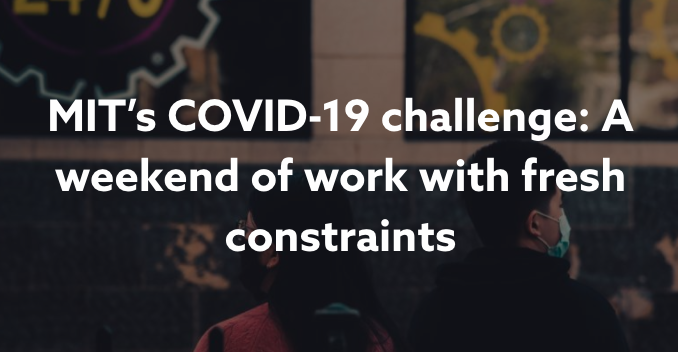
It’s one of life’s frustrations: No matter who you are, some of the smartest people will always be working for someone else. So, in this big world, no matter how great your team is, it pays to be connected with innovators across your industry.
That’s part of the draw of hack events—people ditch their company affiliations and titles at the door, and for a few days they get to use their skills on problems that are bigger than any one company.
Two weeks ago, I joined 1,500 designers, developers, entrepreneurs, patients and health professionals who came together to hack ways to help people through the recovery and reopening from the COVID-19 pandemic. People joined from 40 countries, and all but two US states. I was one of the program’s mentors who provided technical and business insights to participants during the weekend through Slack, Zoom and other apps.

Ester Dyson kicked off the program with the challenge to look beyond responding to problems themselves also to address the structural weaknesses that make them severe. She called out the way that short-term thinking promotes addiction to ever-faster results at the cost of investing in longer-term progress.
“Addiction isn’t just drugs; it’s about people’s obsession with things which on their own may be perfectly good – except when they dominate having a future vision. Facebook is good. Sex is good. Money is good. But when you become so focused on anything in the short-term that you disinvest in the future – then they become horrible. So think long-term.”
By 10 pm, the participants had made nearly four hundred 45-second pitches clustered around the event’s eight tracks. This was all done remotely, and with globally diverse participants who got to know each other working and networking overnight. By 10 am Saturday, they had formed 205 teams, and then had only a day or to move from defining their need to designing solutions and a business model to sustain it.
Participants had been pre-assigned to tracks within two hemispheres of challenge: Recovery & Reopening, and Preventing, Predicting, and Preparing for Resurgence.

These themes are home to some wicked problems. That’s why having all those motivated, new weekend coworkers is so exciting. For a few days, everyone believes that progress is not just possible, but all around them.
One of the participants I worked with, Jothi Arul Prakash Ponnusami summed this feeling up as finding the necessity which drives invention. Reading his post on LinkedIn, you can see how excited he was to be able to gather during social distancing and take on some of the difficulties we’ve all experienced.
Working remotely didn’t dampen the idealism people brought to this challenge of creating more fair and sustainable solutions for coping with COVID. For me, it was a chance to see if remote groups of strangers could self-organize – and to get to see a series of teams taking-on different needs while facing the same predictable challenges that are the hurdles to make effective solutions.
There are over 100 global events that gather volunteers to hack medicine around the world. MIT’s Hacking Medicine project hosts an updated list to find a healthcare hack that fits your schedule and interests. They also have a guidebook for organizing your own hacking medicine event to address needs in your community.
And regardless if you attend an event or not, you can find innovation frameworks and other events at MIT’s rallying point for entrepreneurship, MIT Orbit. I’ve missed the random meetings and insights events like this can provide. But thanks to the COVID Challenge, we had a digital dose of community that kept connecting innovators until we convene again in-person.
Learn more best practices for innovating digital healthcare experiences.

Dave Wieneke leads PK’s focus on serving the digital experiences of healthcare organizations, establishing a baseline method of measurement as outlined in PK’s Hospital Digital Experience Index. He’s partnered with executive teams at Harvard University, KinderCare Education, OHSU, and Everence Financial to advance their digital business capabilities. Prior to agency life, Dave directed digital teams for Thomson Reuters, the Christian Science Monitor, Sokolove Law and the states of New Jersey and Massachusetts. Dave is a graduate of the Rhode Island School of Design and teaches about customer-centered management at the Rutgers Business School.
The original version of this page was published at: https://pkglobal.com/blog/2020/06/mit-covid-19-challenge/
Concentrix Catalyst is the experience design and engineering team of Concentrix, a leading global solutions company that reimagines everything CX through strategy, talent, and technology. We combin... Read more
Due to COVID-19, companies around the globe are currently facing a new reality, and the pressure to keep operations up and running when employees are unable to work is at an all-time ...read more
By Dave Wieneke - Ping An is China’s second-largest life and property & casualty insurer. In the next sixty days, they plan to open 1,000 clinics, with none having on-site ...read more
Years ago, I sat in a conference room on the campus of a global technology company. The distance from one end of the room to the other was so great that people spoke to each other ...read more
When crisis makes “business as usual” thinking implausible, it clears the way for change. The inertia that may have kept outdated practices in place subsides as the premium ...read more